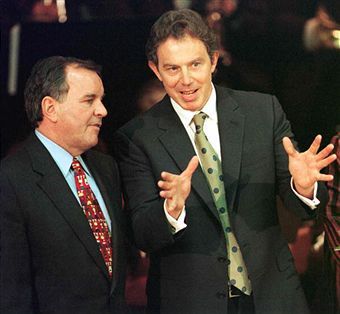 David Cameron’s speech to the United Nations yesterday was, among other things, a defence of liberal intervention. It reminded numerous
observers of Tony Blair’s famous speech in Chicago in, the setting for the so-called Chicago Doctrine that guided his foreign policy thereafter. The Spectator said surprisingly little about
Blair’s speech, perhaps because it wrote the following 5 days before the speech was made on 22 April 1999.
David Cameron’s speech to the United Nations yesterday was, among other things, a defence of liberal intervention. It reminded numerous
observers of Tony Blair’s famous speech in Chicago in, the setting for the so-called Chicago Doctrine that guided his foreign policy thereafter. The Spectator said surprisingly little about
Blair’s speech, perhaps because it wrote the following 5 days before the speech was made on 22 April 1999.
End this liberal war, The Spectator, 17 April 1999
We can now see how liberals start wars, and wage them. First, they notice on television that people are being ill-treated or murdered. The victims have to be European, for then President Clinton
and Mr Blair can evoke Hitler and the fate of the Jews and imply that the generation of Mr Clinton and Mr Blair is more resolute than that of Neville Chamberlain. Then they check with their focus
groups that they are expected to do something. In Mr Clinton’s case, the next step is to remember the one war which he knows a lot about, and conclude that doing something must not amount to
sending ground forces, as in Vietnam. The one war which Mr Blair seems to know anything about is the Falklands. It tells him that appearing resolute hugely helps re-election.
On such a strategic basis has this Balkan war proceeded. The national interest has been scorned. Mr Blair suggests instead that he is waging war on behalf of humanity in general. But humanity in general is not providing the troops. America is, mainly, but also Britain, and the rest of Nato’s core, with lesser degrees of enthusiasm on the part of their governments. Even Mr Clinton and Mr Blair know that the peoples who elected them are unprepared for their troops to die for humanity in general. So the war is confined for as long as possible to the air. The result is that Mr Milosevic commands more support at home than ever before and, amid the fog of war, is able to murder or drive from their homes more Kosovo Albanians than he otherwise would.
The result is a lethal mess. So far, the war has achieved neither the collapse of Mr Milosevic nor the saving of Kosovar lives. It is time to end this 19th-century Liberal war and replace it with 19th-century Conservatism: to replace Gladstone with Bismarck or at least Disraeli? Neither Disraeli’s nor Bismarck’s detached attitude to the Balkans would have got us into this situation. But, having got into it, only their kind of hardheadedness can get us safely out of it. Instead of basing his actions on some conception of the interests of humanity in general, Mr Blair must now base them on the British national interest.
The British national interest lies in a strong Nato. That is, in a strong alliance with the United States. That saved Britain after we had become involved in two European, later world, wars in this century, and when we were later threatened by this Balkan adventure to which Mr Clinton and Mr Blair have almost frivolously committed it. Nato must not emerge from this war weakened; and thus no longer the guarantor of Britain’s security. So it must prevent Milosevic from plausibly claiming victory.
That may in the end mean ground forces invading Kosovo, not merely ‘policing’ some ‘settlement’. It may mean intensifying the air attacks. It may mean subtle diplomacy drawing Russia into a partnership with Nato in the Balkans. It may mean a combination of the three. Whatever happens, all who have doubts about this war, and who would not have started it in the way that Mr Clinton and Mr Blair did, should understand that we cannot simply give up. The way things are going, this now botched war will end with a botched peace: a partition of Kosovo, with the Serbs taking their ‘holy places’ and Nato the rest. Both Nato and Milosevic will claim victory. That will not be good enough. It will have been shown that the alliance on which British security rests cannot defeat a regional demagogue. That would be frightening precedent for the future.
We can do better than that. When we have done so, we must ensure that shallow thinking, of the kind displayed by Mr Clinton and Mr Blair, never lands us in such a situation again. The mixture of vanity and incompetence which they have shown up until now is no foundation for the West’s foreign and fence policy. But there is still time for them to redeem themselves by abandoning the weak reasoning on which they have based their lifetimes’ thoughts about war and peace, and putting first the interests of the peoples who elected them.






Comments